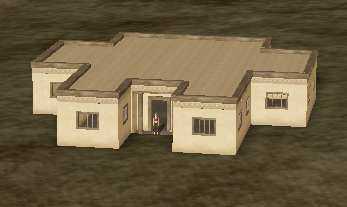The Wiki for Tale 4 is in read-only mode and is available for archival and reference purposes only. Please visit the current Tale 11 Wiki in the meantime.
If you have any issues with this Wiki, please post in #wiki-editing on Discord or contact Brad in-game.
Difference between revisions of "Compound"
| (16 intermediate revisions by 13 users not shown) | |||
| Line 1: | Line 1: | ||
{{Template:BuildingInfo|image=Compound.png|size=Varies|where=[[where::Outside]] | {{Template:BuildingInfo|image=Compound.png|size=Varies|where=[[where::Outside]] | ||
| − | |description= | + | |description=Where things get done. |
}} | }} | ||
| − | A compound is a customizable [[Buildings|building] inside which other buildings can be constructed. In effect, it is a structure used to hold other structures. Many buildings can only be built inside a compound | + | A compound (CP) is a customizable [[Buildings|building]] inside which other buildings can be constructed. In effect, it is a structure used to hold other structures. Many buildings can only be built inside a compound. |
| − | |||
| − | |||
| + | Compounds gradually decay over time unless a [[cornerstone]] has been installed. Note that when your compund has been used a while (?) tearing it down won't give you materials back. | ||
| + | To expand your CP click on the outer border and then choose Blueprints -> Edit blueprints -> Building shape -> Add a sector and finally click on the outer wall. Note that after these steps you must load materials for actual expanding your CP and in the mean time you are not able to maintain or create new buildings in your CP. | ||
== Source == | == Source == | ||
| − | Requires [[Compound Construction]] | + | Requires [[requires::Compound Construction]] |
== Cost == | == Cost == | ||
| − | * 100 [[Boards]] | + | * 100 [[requires::Boards]] |
| − | * 200 [[Bricks]] | + | * 200 [[requires::Bricks]] |
| Line 24: | Line 24: | ||
== Tests == | == Tests == | ||
| − | [[Principles of Architecture]] requires a compound to be | + | [[Principles of Architecture]] requires a compound to be built and expanded to 16 sectors to pass. A sector is 16 by 16 cells. |
| − | |||
== Types == | == Types == | ||
| − | It is expected that multiple compounds will be unlocked over time | + | It is expected that multiple compounds will be unlocked over time. There are now 2 different compounds available. |
'''Town House''' | '''Town House''' | ||
| − | * | + | * 50 Maximum Cells |
| + | '''[[Breezeway]]''' | ||
| + | * 84 Maximum Cells | ||
| + | |||
| + | == Facade == | ||
| + | You may not change the facade type on the corners of your compound. | ||
| + | {{RequiredBy}} | ||
| + | {{ProducedBy}} | ||
[[Category:Buildings]] | [[Category:Buildings]] | ||
| + | |||
| + | {{Languages}} | ||
Latest revision as of 10:58, 8 February 2011
A compound (CP) is a customizable building inside which other buildings can be constructed. In effect, it is a structure used to hold other structures. Many buildings can only be built inside a compound.
Compounds gradually decay over time unless a cornerstone has been installed. Note that when your compund has been used a while (?) tearing it down won't give you materials back.
To expand your CP click on the outer border and then choose Blueprints -> Edit blueprints -> Building shape -> Add a sector and finally click on the outer wall. Note that after these steps you must load materials for actual expanding your CP and in the mean time you are not able to maintain or create new buildings in your CP.
Source
Requires Compound Construction
Cost
Use
All indoor buildings need to be placed in a compound.
Tests
Principles of Architecture requires a compound to be built and expanded to 16 sectors to pass. A sector is 16 by 16 cells.
Types
It is expected that multiple compounds will be unlocked over time. There are now 2 different compounds available.
Town House
- 50 Maximum Cells
- 84 Maximum Cells
Facade
You may not change the facade type on the corners of your compound.
